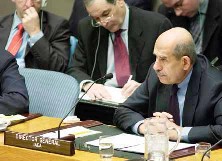|
afrol News, 8 March - The documents produced by the US and UK governments alleging a contact between the Nigerien and the Iraqi governments with the aim of exporting uranium are considered fabrications, according to Mohamed ElBaradei, Director-General of the International Atomic Energy Agency (IAEA). The Nigerien government thus comes clean on US-UK claims. US officials in December publicly claimed that Niger signed an agreement in year 2000 to sell Iraq 500 metric tons of a concentrated form of uranium known as yellowcake. The British government also presented the IAEA with "Nigerian state documents" that were to prove Nigerien-Iraqi attempts to trade in uranium after the UN embargo on Iraq strictly forbade this. This "documentation" has been a key element in the US-UK quest to prove Iraq is still trying to develop nuclear arms. Niger supplied Iraq with yellowcake for its nuclear program in the 1980s, which at that time was legal. During the last months, the British and American governments have tried to prove that Niger recently agreed to resume those shipments, illegal since 1991. US officials claim that Iraq imported uranium from Niger even after 1998 and that more shipments were planned in 2000.
Officials from Niger have however strongly denied these claims. Niger's former Minister of Mining and Energy told the press these charges were "lies". He added that Niger always had cleared their uranium sales with the IAEA, complying with their so-called "red list" that bans certain countries from buying uranium. Also, uranium sales could not be made without the knowledge of the French-owned company Cogema, which operates uranium mining in Niger, the ex-Minister said. Nigerien officials have also denied there have been made uranium shipments to Iraq in the 1980s. The UN weapon inspectors in Iraq however have confirmed that Niger sold concentrated uranium to Iraq on two occasions; one shipment in 1981 and a second shipment in 1982. If Niger is found to have sold uranium to Iraq after the 1991 embargo, the Niamey government would be found guilty of the most serious violation of the sanction imposed on Iraq. This would further question Niger's reliability when it comes to sell uranium to dubious recipients, such as terrorists. Niger thus easily could be placed in the US category of "rough states". IAEA-leader Mohamed ElBaradei now however totally cleans Niger's name and reputation, regarding the US-UK initiative to put the country in connection with Baghdad's alleged ongoing programmes of developing weapons of mass destruction. Mr ElBaradei concluded the documentation presented was not authentic. "We have therefore concluded that these specific allegations were unfounded," he said. The IAEA indeed casts doubts on the allegations Iraq is still trying to develop nuclear weapons altogether. "After three months of intrusive inspections, we have to date found no evidence or plausible indication of the revival of a nuclear weapons programme in Iraq," Mr ElBaradei yesterday told the UN Security Council. The case made against Iraq regarding a nuclear weapons programme more and more seems to have been fabricated in London and Washington. The allegations first surfaced in London, in a British government dossier of 24 September 2002. Without naming a source country, the British document claimed Iraq had recently bought uranium to renew its nuclear weapons programme. On 19 December, Niger for the first time was launched as the source of new Iraqi uranium purchases. A US State Department paper, elaborating on the British claims, focused on Niger, the world's third largest uranium producer after Canada and Australia, and the foremost Muslim state producing uranium. According to IAEA officials, Western intelligence agencies had provided them with documents consisting of correspondence between Iraqi and Nigerien government officials. After comparing the letters with official documents of the Niger government, however, IAEA discovered the "documents" were falsifications produced in London and Washington. The forgery obviously had been made in a dilettante way, with signatures, names and letterheads not corresponding with official Nigerien state documents. Mr ElBaradei publicly said his inspectors had concluded the documents provided by the US and UK "were, in fact, not authentic" after scrutinising "the form, format, contents and signatures ... of the alleged procurement-related documentation." There were therefore no indications of "recent uranium transactions between Iraq and the Niger." Meanwhile, the Nigerien government can calm down again after the substantial threat to its good reputation has been completely dismissed. Niger, the world's second poorest country, is heavily dependent on Western aid and on its uranium exports. Still, the dismissal of the claims against Niger will leave an uneasy calm in Niamey government offices. The government will ask itself why Niger's name and reputation was being sacrificed to build a case against Iraq. The new stories circulating about how the forged papers came into being should sound comforting; they had been sold to an Italian intelligence agent by a con man some time ago, with the simple aim of making easy money. The US and UK intelligence services had of course not been involved, anonymous sources now say. This seems a very convenient version to all parties implied.
|
front page
| news
| countries
| archive
| currencies
| news alerts login
| about afrol News
| contact
| advertise
| español
©
afrol News.
Reproducing or buying afrol News' articles.
You can contact us at mail@afrol.com

